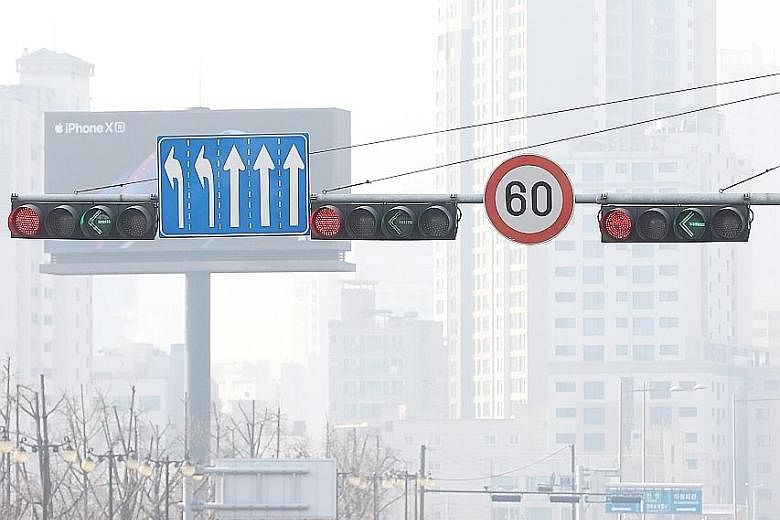SEOUL • Most of South Korea was shrouded in high levels of ultrafine particles yesterday, prompting the Ministry of Environment and municipalities to enforce emergency measures for the second consecutive day.
Seoul's fine dust level stood at 189 micrograms per cubic metre as of 2pm yesterday, according to national air quality monitor Air Korea.
The ultrafine dust level yesterday reached 146 micrograms in the nation's capital - nearly six times the World Health Organisation's recommended daily average of 25 micrograms. Elsewhere, the fine dust levels were also at worrying levels - 191 micrograms per cubic metre in Gyeonggi province, 174 in Sejong and Incheon, and 160 in North Chungcheong province.
The government on Sunday sent out emergency alerts to warn about the high dust levels expected yesterday. It asked pedestrians to put on masks and refrain from outdoor activities.
Emergency measures aimed at tackling the dust particles took effect in 10 cities and provinces, including Seoul, Busan, Daejeon, Sejong, Gwangju and North and South Chungcheong provinces.
When such emergency measures are in force, thermal power plants in the areas affected must reduce their output to 80 per cent of normal operations.
Also, certain old diesel cars registered in Seoul before 2005 are banned from the city's roads.

The government also shut down some 430 parking lots at state-run organisations in Seoul to discourage people from driving into the city. To further reduce the volume of vehicles that could add to the pollution, half of government vehicles are banned from the roads.
Yesterday was the third time that emergency measures had been taken to combat dust pollution, following instances in January and March last year.
The level of pollution started to climb last Friday. Over the weekend, the fine dust level hovered at around 89 to 107 micrograms, and the ultrafine dust level was between 63 and 73 in central Seoul, forcing people to stay indoors.
The nationwide levels of fine dust will remain high until the cold winds from the north bring down the temperature and clear the air some time today, said the Korea Meteorological Administration.
But questions remain over the effectiveness of the government's emergency measures, which focus on tackling the fine dust particles produced domestically.
South Koreans largely perceive a huge portion of the fine dust to come from industrial areas in China, though there is no scientific research that could measure how much China contributes to the air pollution in Korea.
Seoul Mayor Park Won-soon recently countered Beijing's claims that China has nothing to do with the fine dust over the Korean Peninsula, citing research that suggests around 50 per cent to 60 per cent of fine dust over South Korea originates from China.
A spokesman for the Chinese Ministry of Ecology and Environment said in December that the air quality in China had improved over the years through regulatory measures, while that of Korea has worsened in the same period.
THE KOREA HERALD/ASIA NEWS NETWORK

